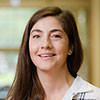This article is more than 5 years old.
In this installment of our 5 Questions series, we delve into the archives with our very own Collections Archivist, Stephanie Bennett. Here, she talks to us about what drew her to archival work, shares one of her favorite University artifacts and offers advice to first year students about making the most of their experience at Wake Forest University.
So Stephanie, what is a day in the life like as the Z. Smith Reynolds Library Collections Archivist?
Each day brings something new, which I love! Tasks that I complete regularly (often with the help of my colleagues and our hard-working students) include:
- Picking up boxes of paper records or discs and hard drives of electronic records from offices and departments around campus.
- Going through records to house them in acid-free folders and boxes that ensure longer lives. I also list the files so that researchers know what each collection contains.
- Keeping track of all the artifacts and collections on our shelves, so we can find things easily. A collection of 10 boxes in all different shapes and sizes can be harder to shelve and hunt down than a single book, which is what most people associate with libraries.
- Working with student assistants on projects, which can be shifting books or doing some detective work regarding a Baptist church’s history.
- Answering reference questions about our collections – these can be as simple as “how do I find Wake Forest’s archives” or as complicated as trying to locate a specific document in one church’s records.
- Meeting with colleagues to discuss how we will store, preserve, and provide access to electronic files and online content created by WFU’s faculty, staff, and students
How did you discover your passion for archival work?
It was pure chance – I worked in corporate research for a while, writing white papers on topics related to training, performance management, and leadership, but decided that I wanted to do research in libraries, not just for a company; I have spent a lot of time in libraries across my life. When I started looking at graduate schools that offered Masters in Library Science, I discovered archives. A friend put me in touch with a wonderful archivist who was very patient with my lack of understanding about the field. With her encouragement, I decided to specialize in archives management in graduate school, figuring I could drop it and become a librarian… and here I am, an archivist after all!
What are the archives comprised of, and what are some interesting items you’ve come across so far in your work?
Special Collections encompasses rare books and collections from “civilians” (i.e., not official people in the University) that we call manuscript collections; these include the records of the Dolmen Press, an Irish publisher that focused on poetry, and collections like that of Sophie Stevens Lanneau, which reflect her work as an educational missionary and the travel that accompanied that. I also work with University Archives, the records of the University’s day-to-day work. This isn’t just the reports and letters of high-up administrators like President Hatch or Provost Kersh; we also have collections from Student Government, social groups such as sororities and fraternities, the Museum of Anthropology, and individual academic departments.
I really like looking at our artifact collection – as an alumna, this Go Deacs hat is my jam. But most collections have informational (research) or artifactual (“look at this!”) value – or both. The items we provide access to can be used in ways that I can’t dream up. It’s always cool to see how people apply our holdings to their work or studies!
Do you have a *dream collection*, in terms of archival work? What collection would you love to work with?
I’ve always said that I would love to work for Oprah. She has had such an effect on so many different communities over the years, I bet the things that she has collected reflect that diversity. Oprah, call me! That said, all our collections contain compelling information or provide value. We may think we don’t have much in common with a Baptist missionary, but collections prove me wrong all the time. Old letters often contain lines that stick in my mind; even administrators giving advice to each other or swapping a little humor. Dry college reports are often filled with information and statistics that can be recycled to compare and contrast the Wake Forests of the past with ours in the present. Basically, I love working with all the collections that help us answer questions from the Wake Forest community and the public!
As a fellow Deacon (class of 2006), what advice do you have for all of our first year students on making the most of their experience at Wake Forest University?
I learned the most, and have the fondest memories, at Wake when I was uncomfortable. This included going outside my comfort zone to try new things, like joining the student newspaper or working on class or community projects with people whom I found intimidating. Spoiler alert: some of those intimidating people are my close friends now! I still use that sense, too – when I feel a little nervous about a new challenge, I know I’m on the right track.

4 Comments on ‘5 Questions for Stephanie Bennett, Collections Archivist’
Great interview! I love the advice about getting out of your comfort zone! I struggle with that every day! (But it’s where the best stuff happens, so I keep trying!)
We’re happy you stuck with being an archivist, and found your way back to Mother, So Dear!
It is great to see such passion for this often overlooked but necessary work. Wake Forest is fortunate to have her.
Brains and beauty?! What a gem!